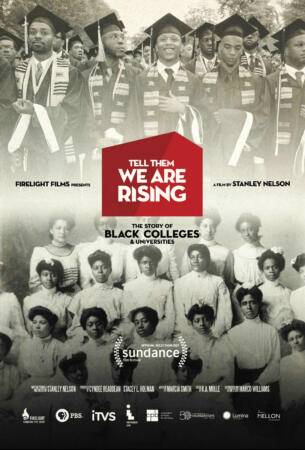
To this day, education is not an inherent right. The effects of segregation are still deeply steeped in the Black community, and unless there is careful nurturing within the family home or by some particularly devoted educators, many Black people in this country have found themselves severely under and uneducated. Despite the lack of resources that are devoted to many public schools particularly in impoverished communities; Black people have always desired the opportunity to learn more about not only themselves but also the world around them. After all, is that not education’s purpose?
In his documentary feature, “Tell Them We Are Rising: The Story of Historically Black Colleges and Universities,” Emmy Award-winning documentary filmmaker, Stanley Nelson tells the virtually untold story of the institutions that helped to redefine what it means to be Black in America. Beginning in the days of slavery when even teaching a slave to read could cost you your life no matter the color of your skin, Nelson opens his film by outlining what historian Marybeth Gasman labels as, the “brutality of ignorance.” White supremacists and plantation owners deeply feared uprisings should enslaved people become truly aware of the circumstances in which they were forced to live. Therefore, when Emancipation did come, the desire to read and learn spread like wildfire. It was as if, “the entire race awoke.”
Told in vignettes labeled, “Rising,” “Golden Age,” “An Audacious Plan” and “Freedom,” Nelson’s film moves swiftly. From post-Emancipation where the first Black colleges were set up by white missionaries and by the African Methodist Episcopal Church, through the present day plights of some once predominant HBCUs; some one-hundred fifty plus years are covered in the film. And yet, despite the traditional PBS-type format of the documentary, Nelson chose to move rapidly through facts and figures and to focus on some specific aspects of HBCUs that I found incredibly fascinating. A great deal of time is spent on Booker T. Washington’s push for technical education in Black academia, the Greensboro sit-ins and the 1972 protests at Southern University that left two students dead.
Most astounding to me as a viewer was Nelson’s visceral assessment of Booker T. Washington’s approach to Black education. As one of the only Blacks to head an HBCU during the 19th century, Nelson is clear about the disservice and damage that Washington did to Black students by relegating them to service roles that appealed to white people. The militant codes that were put in place by white administrative leaders during this period also did a ton of harm; resulting in students resisting oppression on their own campuses while simultaneously fighting oppression in the world as a whole. It is very rare still that historically Black figures views and ideals are challenged, and this was a welcome change from the status quo.
Told with talking heads, both of historians and students who attended and attend HBCUs, the documentary pieces together black and white photographs from the 19th century along with current day footage of Black millennials during their first days on campus. “Tell Them We Are Rising” is extremely informative but also leaves the viewer feeling like they’ve just watched three mini-documentaries slid in among the overall history of HBCUs in America. As much information that it provided, I also walked away from the film with more questions than I had answers, but that’s not always a bad thing.
“Tell Them We Are Rising” isn’t a comprehensive look at HBCUs. The film barely touches on the roles that sororities and fraternities play on campuses and in the Black community overall. Additionally, the film does not linger on the lasting effects that Brown v. Board and desegregation had on HBCU enrollment and funding. For example, while many HBCUs like the now unaccredited Morris Brown College are struggling to stay afloat, the actions that have led to their demise are not discussed. Still, the film is exemplary in that it brings up many questions about the legacy of HBCUs in America and their precarious place as we press forward into what is now a very uncertain future. As we hear from some Florida A & M University and Howard University millennials, it is evident now more than ever that safe spaces for Black students are desperately needed. Most importantly, it is a film that reminds us that despite whatever is happening around us, we are still rising.
“Tell Them We Are Rising: The Story of Historically Black Colleges and Universities” premiered at Sundance. It will be broadcast on the PBS’ Independent Lens later this year.
Aramide A Tinubu has her Master’s in Film Studies from Columbia University. She wrote her thesis on Black Girlhood and Parental Loss in Contemporary Black American Cinema. She’s a cinephile, bookworm, blogger, and NYU + Columbia University alum. You can read her blog at: www.chocolategirlinthecity.com or tweet her @midnightrami

